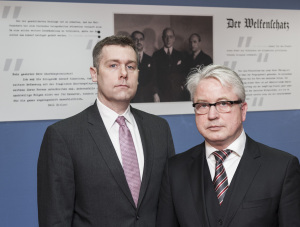Making Sense of Canada, Mexico Tariffs in the Art Market
Making Sense of Canada and Mexico Tariffs in the Art Market
Topics: The Art Newspaper, Customs, President, COVID-19, White House, Mexico, Canada, Constitution, Customs and Border Protection, Tariffs, Tariff Act of 1930, Smoot-Hawley, Federal Register, Department of Homeland Security, Higher Education Act of 1965, Notice of Implementation of Additional Duties, International Emergency Economic Powers Act, National Emergencies Act, 50 U.S.C. § 1702(a)(1)(B), Administrative Procedures Act, HEROES Act, Biden v. Nebraska, Loper Bright Enterprises v. Raimondo
FinCEN Signals Suspicion of Art Market Even Before AML Study Begins
In connection with the late-2020 amendment to the Bank Secrecy Act (BSA) to include “dealers in antiquities” as a result of its inclusion in the National Defense Authorization Act (NDAA), the Treasury Department’s Financial Crimes Enforcement Network (FinCEN) has issued a notice of “Efforts Related to Trade in Antiquities and Art.” The notice is a combination of guidance to entities now covered by the BSA, but it is also a potential backdoor around the entities that Congress chose not to regulate with respect to potential or perceived money laundering risks: art dealers. It also raises concerns about the objectivity of the forthcoming study of the art market that Congress instructed FinCEN to conduct. In either event, it is further evidence that momentum continues to gather for stricter oversight and regulation of the U.S. art market, and the importance of the art trade demonstrating more transparency and diligence if it hopes to modify or mitigate that regulation.
Topics: The Art Newspaper, Nazi-looted art, Antiquities, Terrorist financing, Responsible Art Market initiative, Money laundering, FinCEN, A Tragic Fate, Financial Crimes Enforcement Network, Illicit Art and Antiquities Trafficking Protection, suspicious activity reports, Corporate Transparency Act of 2019, Bank Secrecy Act, National Defense Authorization Act
A Deaccessioning Decision Tree Grows in Brooklyn—Selling Museum Art in Hard Times
Robin Pogrebin at the New York Times has written an excellent piece on the news that the Brooklyn Museum intends to sell several works from its collection to raise money. The museum explicitly relies on the pandemic-inspired announcement in April by the Association of Art Museum Directors (AAMD) relaxing its industry guidance (and pausing sanctions) with regard to the proceeds of the sale of art and how the resulting proceeds should or should not be used. The parallel announcement by a Syracuse museum that it intends to sell a Jackson Pollock painting in a manner more consistent with the old rules provides an instructive moment to consider what has really changed in six months of a new era.
Topics: The Art Newspaper, Jackson Pollock, Deaccessioning, Boston Globe, Association of Art Museum Directors, Lucas Cranach the Elder, New York Times, AAMD, Berkshire Museum, Apollo Magazine, Brooklyn Museum, Robin Pogrebin, Syracuse University, Anne Pasternak, Lucretia, Courbet, Corot, Red Composition, Lisa Simpson, Donato de’ Bardi, NY Board of Regents, Jeff Jacoby, C. Montgomery Burns, Royal Academy of Arts
Event: A Responsible Art Market in Practice, February 1, 2019 in Geneva
Readers of the Art Law Report know that for several years running now, I have enjoyed events in Geneva organized by the Art Law Foundation and the Responsible Art Market Initiative in January/February. I am happy to report that this year is no exception. RAM is presenting its latest event “A Responsible Art Market in Practice,” to be held on Friday February 1, 2019 at the Palexpo in the venue of the artgenève fair. After joining the RAM Taskforce and contributing to its Toolkit and country guide for the US, I am pleased to be presenting one of the case studies, in between a roster of distinguished speakers and experts. I hope to see you there!
Topics: Art Law Foundation, The Art Newspaper, Geneva, artgenève, Sandrine Giroud, Lalive, Irina Tarsis, Sullivan & Worcester LLP, Suzanne Gyorgy, Georgina Adam, Nicholas M. O'Donnell, Art Law Centre, Mathilde Heaton, Jean-Bernard Schmid, Responsible Art Market initiative, Phillips, Financial Times, Palexpo, Justine Ferland, Carine Decroi, Artcurial, Philippe Davet, CitiBank, Aude Lemogne, Ochsner & associés, Roland Foord, Stephenson Harwood, Association Marché d’Art Suisse, Blondeau & Cie, Andreas Ritter
Event—Global Auction House Summit in London, February 4-6, 2019
I am pleased to be speaking on a panel at the upcoming Global Auction House Summit presented by Invaluable, the leading technology partner for online auction services. I will be presenting on the issues of Managing Reputation & Risk, and look forward to a lively discussion. The conference schedule is reprinted below, and registration is available here.
Topics: Auctions, London, Melanie Gerlis, The Art Newspaper, Sullivan & Worcester LLP, Events, Sotheby's, Nicholas M. O'Donnell, Art Loss Register, Real Estate Development, Affordable Housing, Institutional Shareholder Services, Proxy Voting Policies, John Albrecht, US Trust, ARTMYN, Cuseum, Andrea Danese, Athena Art Finance, Jakob Dupont, Bruun Rasmussen Auctioneers of Fine Art, Lori Hotz, Lobus, Bas Kuiper, Sophie MacPherson, Julian Radcliffe, Global Auction House Summit, Leonard Joel, Martina Batovic, Dorotheum, Evan Beard, Anna Brady, Anthony Calnek, Brendan Ciecko, Pierre Fautrel, Obvious, Andy Foster, Phillips, Financial Times, Dr. Anna-Sophie Hollenders, Raue LLP, AMFAD, Christopher McKeogh, Gene Shapiro, Sarah Wendell Sherrill, Mary-Alice Stack, Creative United, Rob Weisberg, Invaluable, Georgina C. Winthrop, Grogan & Company, Shapiro Auctions
Something’s Rotten in Düsseldorf—Max Stern Exhibition Cancelled in Response to Restitution Claim
As Germany puts on the much-anticipated exhibition in Bonn of Cornelius Gurlitt’s disputed collection, a strange story has developed not too far away in Düsseldorf. The Stadtmuseum, which is administered by the city itself, had organized—but now cancelled—“Max Stern: from Düsseldorf to Montreal.” The exhibition was scheduled to open in February in Düsseldorf, before traveling to the Haifa art museum in September of 2018 and to the McCord Museum in Montreal in 2019. The city’s acknowledgement that the decision was based on a claim for restitution from the Max Stern Estate is a disturbing development that provides no sound reason to cancel a show about an important dealer who, it is undisputed, was a seminal figure of Nazi persecution.
Topics: Nuremberg laws, Cologne, Cornelius Gurlitt, Germany, The Art Newspaper, Köln, Nazi-looted art, Düsseldorf, The New York Times, A Tragic Fate, Max Stern from Düsseldorf to Montreal, McCord Museum, Reichskammer der bildenden Künste, Dr. and Mrs. Max Stern Foundation, Max Stern Restitution Project, Girl from the Sabine Mountains, Max Stern, Haifa, Francis Xavier Winterhalter, Mädchen aus den Sabiner Bergen, The Artist’s Children, Wilhelm von Schadow, Düsseldorf Kunstpalast, Andreas Achenbach, Sicilian Landscape, Norwegian Landscape, Galerie Max Stern, Mayor Thomas Geisel
Anish Kapoor in Versailles: Requiring Removal of Graffiti Turns Into Compelled Speech
Back in June, sculptor Anish Kapoor installed the sculpture Dirty Corner on the grounds of the famous palace there. Kapoor, who can’t seem to avoid public controversy over his work, saw the sculpture first become the object of debate with regard to its form itself, specifically, the suggestion that the shape of the large work was anatomical. Kapoor coyly fostered speculations about what it was meant to represent, but ultimately demurred that his “work has multiple interpretive possibilities." With recent vandalism and a court order that he remove the graffiti, however, the story has turned into one more about free expression and compelled speech. So far, it does not have a happy ending.
Topics: Rock Fan, Versailles, The Art Newspaper, Fabien Bouglé, Ku Klux Klan, Dirty Corner, Graffiti Art, France, Williams College, Fleur Pellerin, Nazis, Palace of Versailles, Confederate Flag, Richard Serra, Catherine Pégard, refugee crisis, Williams College Museum of Art, First Amendment, Yardbird Suite, Anish Kapoor, François Hollande, vandalism, anti-Semitic, Graffiti, Amherst College, Tilted Arc
Restitution of Constable Painting at the Tate Moves Ahead Again
After putting on hold its prior recommendation back in March of this year, the United Kingdom Spoliation Advisory Panel has recommended that the Tate Gallery in London should return Beaching a Boat, Brighton by John Constable to heirs of Budapest-based (and Jewish) Baron Ferenc Hatvany. The Art Newspaper reports that the Spoliation Panel concluded that the 1946 export license at issue in the springtime uncertainty (located from the Budapest Museum of Fine Arts) was insufficient to overcome the conclusion that title to the looted painting had not passed lawfully.
Topics: John Constable, Soviet, Budapest, Worcestershire, Hungary, London, The Art Newspaper, Beaching a Boat Brighton, Nazi-looted art, Red Army, Mrs P.M. Rainsford, Broadway Art Gallery, Budapest Museum of Fine Arts, Restitution, World War II, Baron Ferenc Hatvany, Tate Gallery, Museums, United Kingdom Spoliation Advisory Panel
Tate Backtracks on Restitution of Constable Painting
As if there weren't enough controversy with national advisory commissions' recommendations about Nazi-looted art, the Tate Gallery in London is apparently reconsidering a recommendation last year by the United Kingdom’s Spoliation Advisory Panel that Beaching a Boat, Brighton (1824) by John Constable should be restituted to heirs of Budapest-based Baron Ferenc Hatvany, who was Jewish.
Topics: John Constable, Soviet, Budapest, Worcestershire, London, The Art Newspaper, Beaching a Boat Brighton, Nazi-looted art, Red Army, Mrs P.M. Rainsford, Broadway Art Gallery, Restitution, World War II, Baron Ferenc Hatvany, Tate Gallery, Washington Principles, United Kingdom Spoliation Advisory Panel
Guelph Treasure Claims—Coverage and Analysis
It has been almost two weeks since I filed my clients’ claims for restitution of the Guelph Treasure (Welfenschatz).
Topics: Maria Altmann, Frankfurter Allgemeine Zeitung, National Socialists, Third Reich, artdaily.org, Reuters, United States Supreme Court, Gestapo, Haaretz, Deutschlandradio. Deutsche Presse Agentur, Robin Young, the Guardian, The Art Newspaper, Foreign Sovereign Immunities Act, The Wall Street Journal, Deutsche Welle, Santa Fe, KRQE News 13, the Observer, Markus Stoetzel, Die Erle, Mel Urbach, Nazis, Advisory Commission, 3SAT, ZDF, Stiftung Preussischer Kulturbesitz, Washington DC, Hermann Goering, Private Wealth, Restitution, Sullivan & Worcester LLP, Here & Now, Gerald Stiebel, World War II, Foreign Sovereign Immunities, flight tax, Süddeutsche Zeitung, Adolf Hitler, United States District Court, The New York Times, Federal Republic of Germany, BBC News Europe, Alan Phillip, Welfenschatz, NPR, PrivateArtInvestor, ArtNet news








